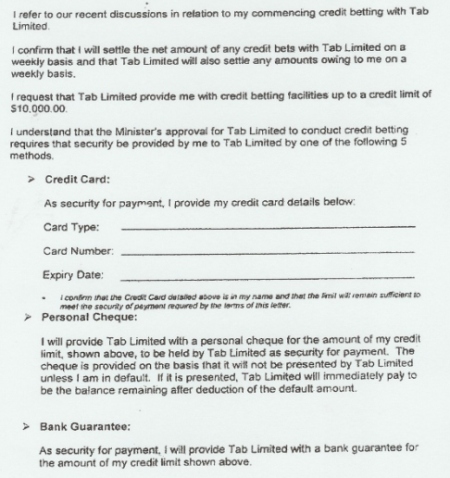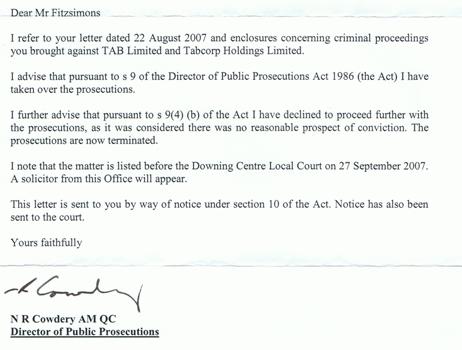Gambling
Related Essays and Reports by Andrew W Scott
The DPP takes over Tabcorp prosecution,
then drops it
September 13th 2007
Nicholas Cowdery, the NSW Director of
Public Prosecutions, has just made what could only be
described as a bizarre decision. Mr Cowdery's decision
will be heartily welcomed by Tabcorp and the NSW Labor
Government, but has devastated one Chris Fitzsimons.
Who's Chris Fitzsimons? He's the former
Chatswood solicitor who wagered more than $10 million
from 2002 to 2006, punting on horses while utilising
a credit betting facility extended to him by the NSW
TAB. He now faces bankruptcy, has lost his practice
and owes more than $1 million to family and friends.
The credit betting facility was continued by Tabcorp
after it took over the TAB in 2004.
'But isn't credit betting illegal?'
I hear you ask. Yes, credit betting is banned in almost
all spheres of gambling in Australia, including at
TAB Agencies throughout NSW. It is also against the
stated policy of the NSW Government. But in secret
discussions in 2002 between then Gaming Minister Richard
Face and the TAB, the TAB cried poor and said gaming
tax revenue was under threat, unless it was able to
offer credit. Despite initial denials and then protestations
of amnesia about the matter, it is a matter of public
record that Face caved in, authorising credit betting
on Sep 2nd 2002, utilising a little known loophole
in the Totalizator Act.
The TAB then got to work, offering
its shiny new credit facility to some 350 'Special
Account Customers', including adman and racing identity
John Singleton. Chris Fitzsimons was also one of the
'special' who was offered credit betting.

An internal information paper for
the eyes of the TAB Board reported Ernst &
Young had estimated an increase in betting
turnover of $10 million for just the first 15 customers
to be offered credit. Extrapolate that to 350 customers
and we are talking an extra $233 million
a year in betting.
Within gambling circles credit betting
is generally acknowledged as a great way for gambling
providers (and thus Governments, through gaming taxes)
to make more money, but it's devastating to problem
gamblers. When a person bets with their own money,
they can still come home with an empty pocket, but
at least they don't come home with an unpayable debt,
and the terrible consequences that arise from that
debt. Normally a punter can't instantly liquidate
the family home and bet it on a horse race in a moment
of madness, but with credit betting any such moment
can lead to the loss of all assets, subsequent bankruptcy
and destroyed lives.
The TAB initially gave Fitzsimons
credit of $5,000 a week. As Fitzsimons continued to
lose it offered him $10,000 a week, then $20,000 a
week: Fitzsimons claims they eventually said, 'tell
us what you want and we'll give it to you'.
Fitzsimons claims a litany of illegal,
deceptive and unconscionable conduct by the TAB over
the period in question, and has a mountain of paperwork
to support his claims.

As a result of this conduct, Fitzsimons
wanted to commence criminal proceedings against TAB
Ltd and Tabcorp. He satisfied the Registrar of the
Downing Centre Local Court of the bona fides of the
case, and was allowed to prosecute 11 charges under
the Crimes Act, including obtaining money
or financial advantage by dishonest deception. He
wrote to the DPP on 6 August this year, requesting
that Mr Cowdery take over the prosecutions. Cowdery's
response was to ask Fitzsimons for a brief, which
was supplied. The case was then put on the DPP's court
list for 27 September.
Fitzsimons was delighted with the
prospect of the DPP taking over the prosecutions,
as the DPP has investigative powers not available
to a private prosecutor, and would therefore be likely
to unearth further evidence of Tabcorp's wrongdoing.
Fitzsimons offered to be interviewed and to assist
the DPP in any way he could.
Imagine Fitzsimons' shock then, when
yesterday he received this letter from the DPP:

The DPP has taken the extraordinary
step of taking over the prosecution, merely so that
he can abandon it. The only reason given was 'it was
considered there was no reasonable prospect of conviction.'
The DPP didn't even bother to interview Fitzsimons
or examine all the evidence he had.
Fitzsimons is now out in the cold.
The DPP's decision means he can no longer pursue the
charges, and he has no avenue of appeal. Fitzsimons
practiced as a criminal solicitor for 35 years, so
certainly has the requisite skills to proceed. He
was not wasting the Court's time, there was a mountain
of evidence involved and a prima facie case
against the TAB. His right to proceed had already
been confirmed by Magistrate O'Shane in an earlier
strike-out motion.
Mr Cowdery's decision effectively
gags Fitzsimons and suppresses all the nasty detail
that would have come out in Court about the secret
credit betting deal done between the NSW Government
and the TAB.
Fitzsimons claims that the Attorney
General has leaned on the DPP to keep the matter quiet.
While this may or may not be true, there is certainly
an appearance here that the DPP wants this matter
buried, and buried quickly. Why take over a case,
just in order to ensure it was dropped?
While the story of ICAC's uncovering
a public housing official taking bribes in the hundreds
of dollars makes it to the papers, efforts appear
to be afoot to keep quiet more serious matters involving
hundreds of millions of dollars and the NSW Government
itself.
Mr Cowdery, if there was no reasonable
prospect of conviction, why not let justice take its
course? Why not allow the Court to make that decision?
Why go to such extraordinary lengths to keep this
matter out of the Courts and out of the media?
What is it that someone is trying
to hide?
Were you offered or involved with
credit betting by the NSW TAB, probably in 2003 or
2004? If you were, I would love to hear from you.
E-mail Andrew Scott
©
2007 Andrew W Scott
Home|FAQs|Disclaimer|Contact
Us
©2000 to present.
OZmium Pty Ltd. All rights reserved